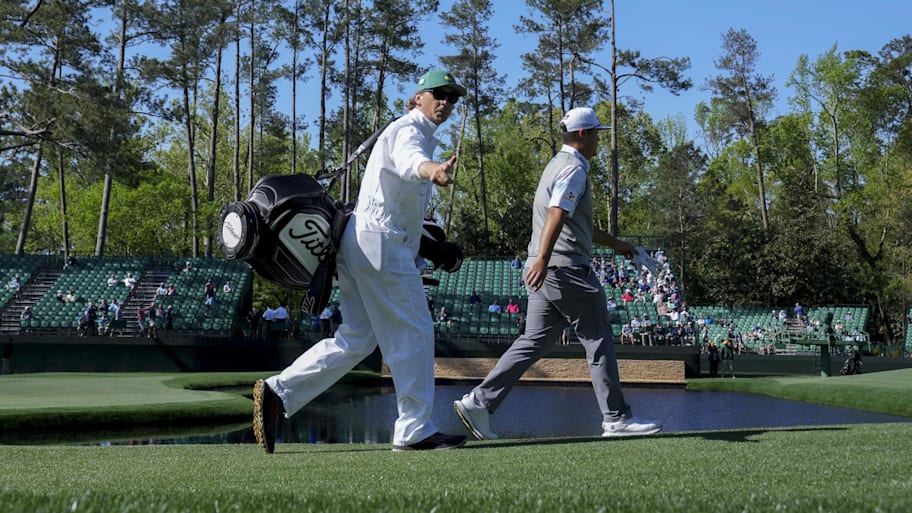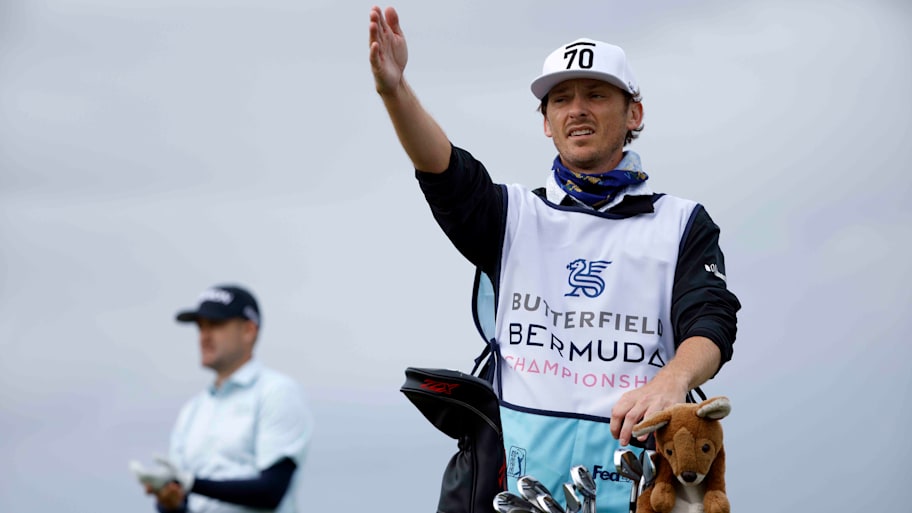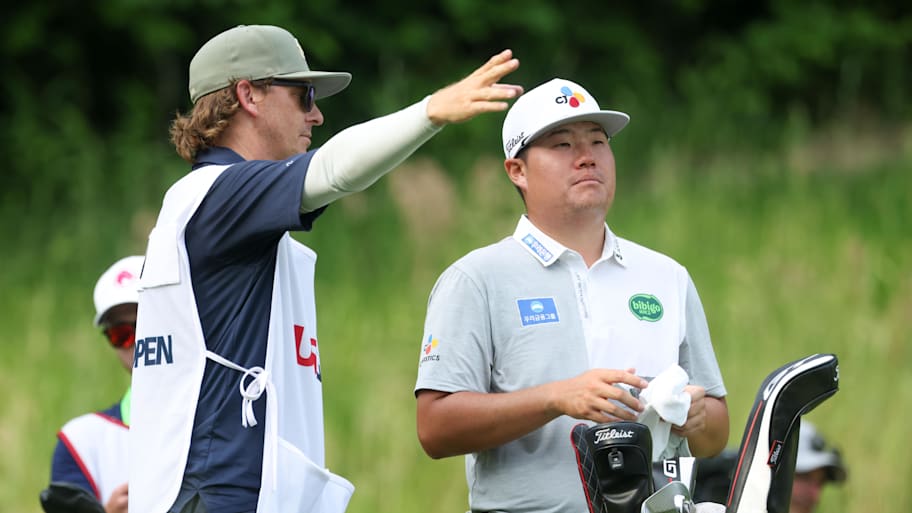
Willy Wilcox’s path to carrying Sungjae Im’s bag was certainly unorthodox.
Now caddying for the world’s 25th-ranked player, Wilcox, 39, was once a self-described “drug addict with a PGA Tour card.” The Pell City, Ala., native won on the PGA Tour Canada and the Korn Ferry Tour before joining the top circuit in 2014, where he racked up 72 career starts. His best finish was a runner-up at the 2015 Barbasol Championship, but his most memorable moment was a hole-in-one on TPC Sawgrass’s iconic 17th hole at the 2016 Players Championship. And shooting the fourth 59 in KFT history at the 2013 Utah Championship is a close second.
Wilcox has battled addiction since he was 15 years old, but golf was always a mainstay in his life. His mother, Kim, was a teaching professional and the head women’s golf coach at the University of Alabama-Birmingham for nearly two decades. That was where Willy started his collegiate career; however, he was kicked off the team after a possession charge and began working as a pizza maker before eventually getting a full ride to Division II Clayton State, as his father knew the coach. Wilcox developed into a three-time All-American, despite continuing to use and even overdosing on a bad batch of cocaine once.
During his PGA Tour career, Wilcox estimates he spent millions of his earnings on drugs, including heroin. And there was constant turbulence. For example, in 2015, his only year qualifying for the FedExCup playoffs, he withdrew from the postseason’s second event, the Deutsche Bank Championship, because he said he wouldn’t have passed a drug test.
In 2017, Wilcox lost his Tour card. His struggles were perceived to be the effects of a wrist injury, but his troubles off the course were the main factor. He managed a few more years on the Korn Ferry Tour, but lost status there, too, after the 2020 season.
“My game was in shambles,” Wilcox told Sports Illustrated. “I was like 150 pounds, now I’m like 185. Yeah, and then I just spiraled for a few months.”
He entered treatment in January 2022 and attempted a career comeback, going down a rabbit hole with his swing. Playing mini-tours, he won on the Emerald Coast Golf Tour in April of that year, but Wilcox’s last Tour-sanctioned start was the KFT’s BMW Charity Pro-Am in June. He missed the cut at 11 over, playing “like an a--hole,” he says, with swing changes blowing up in his face.
That was the end of his golf career.
“If you can’t earn money and you’re a drug addict, you need to quit,” Wilcox says.
But Wilcox was beginning to get his feet wet in another aspect of the game.
From swinging the clubs to carrying them
While still fighting addiction, Wilcox, in 2021, was doing a podcast, which was helping pay his rent. Then, Scottish Tour player Russell Knox, who needed a caddie for the Butterfield Bermuda Championship in October, went on an episode.
“I just asked him during the podcast if I could go over to Bermuda with him because I was vaccinated,” Wilcox says. “He couldn’t find anybody to go over there because the visas and travel was a little funky still because of the pandemic. So it was just kind of like a perfect situation for me to go over there and get that tournament with him.”
Knox called the wind and rain early that week “unplayable” (quite an intro to Wilcox’s PGA Tour caddie career), but managed a T12 finish and a $151,125 payday, from which Wilcox banked $10,000 after getting clean for that tournament.

A few months later, Wilcox was running a water mitigation business with a friend in Atlanta. He moved to Columbus, Ga., in 2018 and became a member of the Country Club of Columbus. There, he met a college golfer named Ben Carr, and the two played together during the pandemic.
In August 2022, Carr, then a fifth-year student at Georgia Southern University, needed a caddie for the U.S. Amateur at Ridgewood Country Club in New Jersey. So Carr posted on Instagram a month before the Amateur that he was looking for someone to carry his bag.
At first, the people who messaged him wanting the job didn’t feel right to Carr—until Wilcox, who was going to be in town that week for a Rage Against the Machine concert at Madison Square Garden.
“I just figured it was too good to pass up, and it was,” Carr told me that week after his quarterfinal match.
Wilcox, per usual, was loose in that role. During the quarterfinals, Carr made a divot on the par-4 16th fairway. Wilcox picked it up and walked back to replace it. Coincidentally, our paths crossed, and he looked at me—a total stranger at the time—and said, “If you take care of the course, the course will take care of you.”
That mantra helped Carr reach the final match against Texas A&M’s Sam Bennett, the third-ranked amateur in the world. Carr, ranked No. 70, went toe-for-toe with Bennett all day, coming back from five holes down before eventually suffering the defeat on the match’s 36th and final hole.
It was still an indelible week, and there was a consolation for making the final: a spot in the following year’s Masters and U.S. Open.
But the good vibes were short-lived for Wilcox.
Two days after the U.S. Amateur, Wilcox was driving—sober—from Birmingham to Atlanta into the rising sun when the interstate came to a screeching halt. He ended up rear-ending a car at roughly 55 mph.
“Was in tons of pain and my hand was all f---ed up and didn’t have any good insurance,” Wilcox says, “so I just had to let it heal.”
Shortly after, he relapsed and ran out of money to continue helping his and his friend’s business get off the ground (Wilcox says the company is currently doing “really well”).
By December, Wilcox had returned to treatment.
Then, Lanto Griffin called.
Griffin, 37, first met Wilcox in 2010 during his professional debut: a Hooters winter series event in Orlando. After that, they stayed friends and frequently played practice rounds together. In 2013, Griffin moved in with Wilcox to help him stay clean.
“I looked up to his golf game so much, it was a no-brainer for me,” Griffin, the 2019 Houston Open winner, told Sports Illustrated. “He always wanted to get clean and I think with the pressure of being a professional golfer, it made it hard.”
Griffin, who is still a Tour member and currently the world’s 296th-ranked player, credits Wilcox with saving his career, ironically because Wilcox allowed Griffin to loop for him 11 years ago.
“I was struggling on mini-tours and I asked if I could caddie for him at the Greenbrier cause I had a family friend who has a cabin near there,” Griffin says. “So he let me and he finished fourth place and cut me a check for $17,000, which was more than I had made in a week playing for my four-year career at the time. I ended up caddying for him twice more after that and if I hadn’t got to the finals of Korn Ferry Q-School that fall, I probably would have caddied for him in 2015.
“Him letting me caddie changed my playing career and wholeheartedly believe I never would have made it on Tour without that opportunity.”
Fast forward to 2023, and the roles switched. Griffin ruptured his L5-S1 disc and underwent surgery in July 2022. While he was sidelined, his regular caddie hopped on Russell Henley’s bag, and when Henley won in Mexico that November, Griffin needed to find a replacement. Knowing Wilcox enjoyed caddying for Knox, Griffin asked Wilcox if he’d give it a shot.
It was an easy decision. Their partnership began in January at the Korn Ferry Tour’s Bahamas Great Exuma Classic. Then came the PGA Tour’s Farmers Insurance Open, AT&T Pebble Beach Pro-Am and Genesis Invitational.
Wilcox was clearly cut out for the role.
“Being a good caddie depends on what an individual player wants and needs,” Griffin says. “Willy doesn’t have a big ego and doesn’t get defensive if a player gets mad or frustrated. He knows from experience how hard golf is and having that mindset takes pressure off his player. Players tend to put way too much pressure on themselves, so when a caddie can do that, it helps a lot.”
However, at the Genesis in February, Griffin fractured a rib and pulled muscles in his back, which caused him to withdraw and shelve the clubs again. When Griffin returned two months later, he decided to hire a more experienced caddie.
“Wasn’t anything personal,” Griffin says, “but felt like I needed a different personality and not a buddy on my bag.”
Even though Wilcox had no hard feelings about Griffin’s decision, he was out of work. He eventually landed a job in April, caddying at Kiawah Island in South Carolina, home of the 2012 and ‘21 PGA Championship. Wilcox had also planned to loop for Carr at the Masters, but Carr went with somebody else.
“I had a lot of people that were telling me that was kind of not right,” Wilcox says, “but I didn’t take it personally.”
Carr, though, asked Wilcox to carry his bag in the U.S. Open at Los Angeles Country Club. And, just like in New Jersey, their chemistry yielded a memorable week with Carr making the cut as an amateur.
After the third round, Wilcox ran into Im—forever changing the trajectory of his life.
A unique yet healthy partnership
Im had missed the cut and went to the locker room to collect his belongings before leaving town. He and Wilcox, who knew each other from playing together on the Korn Ferry Tour, began chatting, and the South Korean revealed he was in the market for a new caddie.
In a flash, Wilcox was hired.
“The interaction went like this,” Wilcox says, “‘Willy, you caddie?’ I said, ‘Yes, I caddie.’ He said, ‘You caddy for me.’”
Why was it so seamless?
“[Im] sees, ‘Oh, this guy was on the PGA Tour.’” Wilcox says, “He’s like, ‘I want to try somebody who is a really good player.’ So that was the main thing that got me hired in that scenario. It was just a perfect storm.”

Im, 27, has not won on the PGA Tour since 2021, but the gig couldn’t be a better fit for Wilcox. Im plays nearly every week, and Wilcox loves everything that comes with being a caddie: the travel, the accountability and the exercise.
Most of all, though, it’s that he’s an at-will employee.
“I’ve always been my own boss,” Wilcox says, “and that can be troublesome for people that have a tendency to do the wrong s---.”
Still, the job has its challenges. There’s a language barrier between Wilcox and Im. And Wilcox knows players can be unreasonable with their caddies, because that’s how he was during his playing days, he admits. But when his patience gets tested, he goes to his “happy place.”
That has always been on the golf course. The only difference now is when Wilcox is walking the fairways, he’s the healthiest—mentally and physically—he’s ever been.
Inside and outside the ropes, that’s the key to his longevity.
“Unfortunately, I think it took his playing career coming to an end for him to really be able to get and stay clean,” Griffin says. “I’m so happy he’s clean and in a weird way I feel like him caddying for a high-level player like Sungjae is a better fit than playing himself.
“Willy is a special human and I’m so happy for his success and I wouldn’t be surprised if in 20-30 years he’s still caddying for top players and regarded as one of the legends of the caddie world.”
It’s been a sinuous journey here, and if any of the chapters Wilcox has experienced to this point are omitted, maybe none of this comes to fruition.
But everything happened for a reason.
“What I’ve been saying about this s--- is, to be in the right place at the right time, you gotta be in the right place, which is the PGA Tour,” Wilcox says. “If you keep hanging around the Tour and doing your work correctly and all that, it gets noticed.”
This article was originally published on www.si.com as The ‘Perfect Storm’ That Led a Former Tour Pro From Addiction to Caddying.







